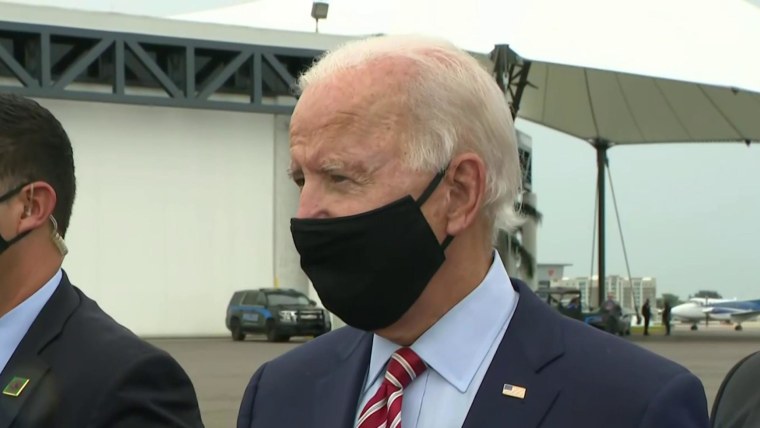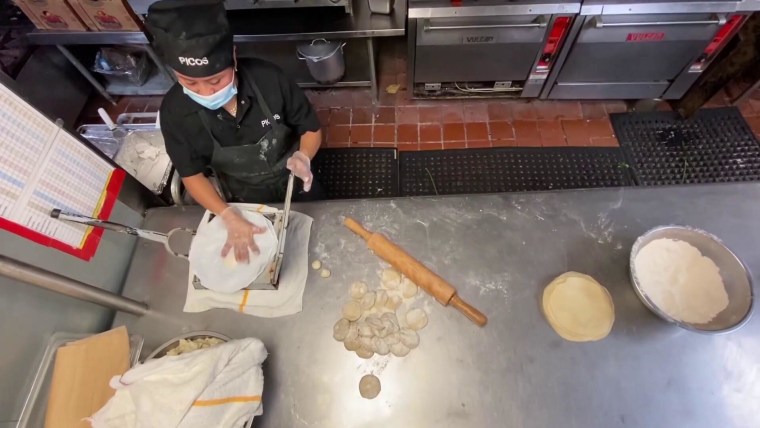WASHINGTON — In some corners of the Latino community, there’s a compelling familiarity to President Donald Trump’s narrative of an American economic comeback that appears to be giving him an opening where it matters most six weeks before the election: at the margins.
It’s a story that has both deep roots and immediate salience for many voters whose families fled political and economic oppression in Latin American countries for security and opportunity in the U.S., as well as for those trying to hold on to what they built in the shadow of the coronavirus crisis.
“We built the greatest economy in history, and now we’re doing it again,” Trump said Wednesday at a Latinos for Trump event in Phoenix. “As Hispanic Americans, you know better than anybody, we implemented historic tax cuts and regulation cuts, the biggest in the history of our country.”
Strategists in both parties say they see an opportunity for Trump to connect with the message that his policies fueled a strong economy — including record low unemployment among Latinos — before the coronavirus struck and that he is leading a recovery that would be endangered if Democratic nominee Joe Biden wins in November.
“One of the reasons that the president is having success with Latino voters is because he is trusted by them on the economy,” former Rep. Carlos Curbelo, R-Fla., said Monday in an interview on MSNBC. “The Hispanic community, especially here in the state of Florida, is an entrepreneurial community.”
Democrats have focused on Biden’s “Build Back Better” recovery plan and disparities in health care costs and outcomes, which they present as an economic issue for Americans, including many Latinos who aren’t wealthy. They blame the economic downturn on Trump’s handling of the coronavirus crisis and note that he took over an economy that was already growing.
“The president has botched the Covid response, botched it badly,” Biden said Sept. 4. “We can’t deal with an economic crisis until you beat the pandemic. You can’t have an economic comeback when almost 1,000 Americans die each day from Covid.”
For now, immigration-related fights, among the most highly charged of Trump’s presidency, have moved out of the spotlight.
The priority many Latino voters place on immigration rises and falls over time — every voter is already a citizen — but economic considerations are necessarily front and center when times are tough. Eighty percent of Hispanic voters surveyed said the economy is “very important” to their choices in the presidential election in a Pew poll released last week, and 76 percent said the same about health care. Immigration ranked eighth — at 59 percent — behind such topics as racial inequality, the makeup of the Supreme Court and climate change.
Trump doesn’t have to win a majority of Latino voters. History and polling suggest he won’t, but moving the needle by a couple of percentage points in a swing state or two could be the difference between re-election and defeat, and more than half a dozen strategists and officials in both parties said the group of Latino men under age 50 includes a subset of rare and highly coveted persuadable voters.
“With tight margins and a tight persuadable universe, there’s going to be a real focus on where you can pick up a point or two,” said Danny Diaz, a veteran Republican campaign strategist. “For Trump, that’s going to mean Hispanic men.”
There’s an opening for Trump or Biden to sway some Latino business owners, said Ramiro Cavazos, president and CEO of the U.S. Hispanic Chamber of Commerce. Before the pandemic, the fastest growth in small business nationally was in the Latino community, and there were more than 600,000 Hispanic-owned small businesses in Florida alone. Many of those business owners are looking for a plan to ensure that they have a fair shot at government-backed loans and federal contracts, Cavazos said.
“Access to capital, access to contracts, those are the two biggest issues for our members,” he said. “We’re hearing that neither party as yet has really put out a serious small-business plan for Latinos and how we’re going to rebuild the economy. I’ve yet to see one.”
Primarily, Trump and Biden are preaching to their respective choirs — Trump to the smaller set of Republican-leaning Latino voters and Biden to their more numerous Democratic counterparts.
The remaining persuadable Latino voters are mostly just seeking security, said Dean Aguillen, a longtime Democratic strategist.
“It’s a mixed bag with those voters, but the health care piece is important,” he said. “Health care and the economy are the two things that move those folks.”
And, of course, one voter or voters in the same household often must weigh considerations from one basket against those in the other — for example, Trump’s promise to roll back small-business regulations against Biden’s vow to maintain the Affordable Care Act’s insurance-industry regulations on pre-existing medical conditions.
It’s impossible to predict voter behavior, but Trump is focusing on a two-sided message — hope and fear — that appears designed to at least tamp down turnout for Biden. In addition to promoting his own record, he is warning Latino voters that a Biden win would move the U.S. toward socialism, even though Biden has denounced the left-wing economic and political ideology. Trump’s campaign had produced an ad with images of Biden, Sen. Bernie Sanders and Latin American strongmen to underscore the point.
“Here in South Florida, there are a lot of victims of these socialist revolutions — Cuba, Venezuela, Nicaragua, the terrorist FARC in Colombia,” Curbelo said. Biden “has been associated with these governments, unfairly, by the Trump campaign, yet he hasn’t defended himself from those attacks.”
Trump trails Biden among Latino voters in polling in all of the swing states, but he does best in Florida. A late-August survey by Equis Research showed Biden leading Trump by 53 percent to 37 percent among Latino voters in Florida, a smaller margin than Hillary Clinton’s 62 percent-to-35 percent win among that set in 2016.
Data like those are sirens for Democratic strategists, and Biden’s team has reacted forcefully, if not quickly, to the alarms. He and his running mate, Sen. Kamala Harris, D-Calif., both campaigned separately in Florida for the first time during the general election season in the last week, and he is increasing spending to target Latino voters in the state with advertising.
On Wednesday, his campaign was scheduled to hold a virtual fundraiser featuring a panel discussion about his “Latino policy agenda” with Julissa Reynoso, a former ambassador to Uruguay; Wally Brewster, a former ambassador to the Dominican Republic; and others.
The Trump campaign has 16 field offices in “key” states to train new Latino volunteers, and its Latinos for Trump arm is focused on voter registration, persuasion and turnout, a campaign official said.
Download the NBC News app for breaking news and politics
Rep. Ruben Gallego, D-Ariz., said that he believes Trump isn’t really making inroads with Latino voters and that in Arizona the persuasion question for most young Latinos isn’t about which candidate to back.
“They’re trying to decide whether to vote for Biden or not vote,” he said, adding that he thinks Trump has done perfunctory outreach in the Latino community “to make middle-class whites feel more comfortable that he’s not a racist.”
But it’s clear right now that Trump is on offense, while Biden is still trying to make sure Latino voters show up and vote for him across swing states like Florida, Arizona, Colorado, Nevada, North Carolina, Pennsylvania and Wisconsin, at least at the same rates they did for Clinton four years ago.
“He’s not where he needs to be,” Aguillen said. “There’s a lot of work to be done. I feel confident that they now understand the significance of it. They’ve just got to get on it.”












